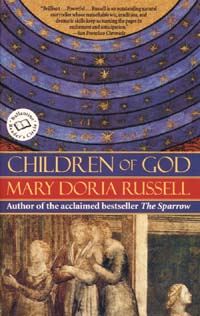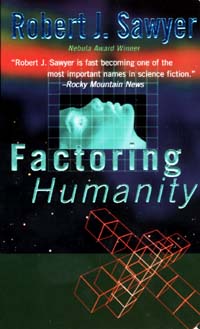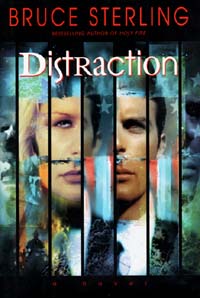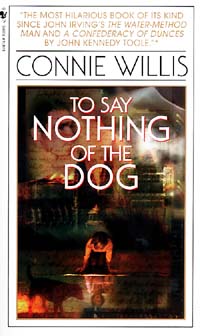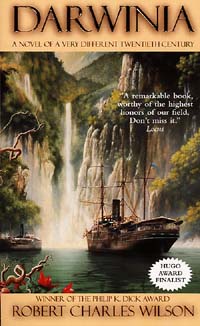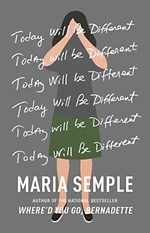Haranguing the Hugos
By Adrienne Martini, Fri., July 30, 1999
|
|
by Mary Doria Russell
Ballantine, $12.95 paper
Factoring Humanity
by Robert J. Sawyer
Tor, $5.99 paper
Distraction: A Novel
by Bruce Sterling
Bantam Spectra, $23.95 hard
To Say Nothing of the Dog
by Connie Willis
Bantam, $6.50 paper
Darwinia
by Robert Charles Wilson
Tor, $6.99 paper
What's in a name? A rose, if called a flurgelbutt, would still smell as sweet. A cat, if called a snarkel, would still cough up big balls of blech at the least opportune moments. And a Robert Sawyer book, if published under the name of Mr. Big Smarty, would still suck like a well-tuned Hoover. It's Hugo time again, old chums. That time of the year when we ponder the best that speculative fiction has to offer, when we wax rhapsodic about the joys of discovering a new world in the palm of your hands, and when we dish over the faults of each of the nominees.
|
|
Oddly enough, this crop of candidates is not exactly the nourishing kernel of speculative fiction goodness that we've come to expect from these awards. Instead of picking the books that boldly go into uncharted space, the core of Hugo voters selected novels that are full of familiar voices doing familiar things in familiar settings. In fact, three of these authors ñ Connie Willis, Robert J. Sawyer, and Austin's own Bruce Sterling ñ are perennial favorites on the Hugo rolls.
In a quirk of kismet, not only are there three recurring writers, this is the third year that I've perused these nominees for the Chronicle. And it is the third year I've been forced to slog through Sawyer's workmanlike words; his Star Trek-esque saga Starplex was nominated in 1997, and his scientist-gone-rogue soap opera The Terminal Experiment made the rolls in '98. It's gotten to the point where I cringe every time I notice he's released a new novel, knowing that his core of rabid fans will weasel him into Hugo contention and that I'll have to chew through another of his tightly (and dully) plotted, ambiguity-free, impulse-less works.
So it came as a great surprise when Factoring Humanity ñ this year's entry ñ turned out to be a good read. The story, set in 2017, wraps around some mysterious signals from space that have been arriving on Earth like clockwork for the past 10 years. Then, one fine day, they stop, long before anyone can really get a handle on what these signals really mean. Except, perhaps, for one lone Canadian scientist who is trapped in a failing marriage, which is falling apart largely because one of her daughters commits suicide ñ and the other daughter doesn't seem that far from a similar course.
Sawyer has taken significant strides with Humanity. Most of these characters ñ from Heather, the wife and scientist, to her husband, a mathematician, and the surviving daughter ñ are fairly well-drawn, given depth by having to make hard choices and, at times, failing to do the right thing. This wavering of moral fortitude is what separates this book from Sawyer's last few, where everyone always seemed to know exactly what to do, which made the plot forced and unnatural.
|
|
Which is not to say that this book is perfect. Sawyer still can't hit the right emotional tone with some of the more heartfelt passages, and he spends more time telling us how his characters are feeling rather than simply showing us. And Sawyer, a native Canadian, seems to be falling into the Canuck conundrum, whereby he tries to insinuate the existence of an "overmind," a metaphysical construct that ethereally connects the sub-subconscious of all humanity and is a vital part of the plot of this book. Several of our neighbors to the North subscribe to this theory, most notably Spider Robinson and fellow nominee Robert Charles Wilson, and it indicates one of the many differences between our two countries. Yes, there are American writers who believe in a similar concept, but it is rarely the benign force that our Canadian cousins propose.
Mary Doria Russell's Children of God is another benign force, a disappointment given the strength of her first book, The Sparrow. God is a continuation of the events of Sparrow, and it finally provides some closure to the characters she stranded in the first book, which you really must have read to understand what in the heck is going on in the sequel. Without giving away too much, God takes a broken Jesuit priest, Emilio Sandoz, and shoves him back into the situation that broke him at the expense of his family, his sanity, and his faith. But the planet, Rakhat, which left him a shell of his pre-space-travel self, has changed, as has his perception of previous events. And it all leads up to a fight where there is no good, no evil ñ just shades of gray.
It's too bad that Russell felt she had to write God and extract her characters from the mess she put them in while giving them an unearned redemption. God feels like a sellout, like Russell was told to make nice to the reading public for writing such a dark novel in the first place. Or, perhaps, she had simply grown fond of these characters and had to write a happy ending for them. Regardless, the cheesy and easy outcome of God weakens the majesty and power of Sparrow, despite the fact that Russell's strength with words and characters still blazes off of every page.
|
|
While Wilson liberally borrows from Christian mythology to set up an argument about predestination versus free will, he keeps continually reshuffling his cards ... and cleverly keeping the ace of spades tucked in his cuff. In some ways, the themes of this book also tie into the action movie The Matrix. Both imply that our lives are controlled by something outside of ourselves; both also hint that the course of events can be shifted. Yet Darwinia continually changes the rules and tops your expectations. It's a gripping, thought-provoking read, even though, at times, it lacks the rollicking action and sense of humor that would make it a classic of the genre.
Which is exactly what Bruce Sterling's Distraction has by the bucketful. From the instant Sterling plunks you down in his post-Information Age world, the snide, snappy comments and continual crisises whiz by like so many Waffle Houses on the side of I-35. It's like Catch-22 for the geek set, full of quirky characters and exploded situations that poke fun at where the country is now and where it will possibly be going if things continue to grow ever more absurd.
And the world Sterling proposes is a nutty one. The government has all but shut down, since the plethora of political splinter groups can't agree on anything. Louisiana, under the direction of crazed governor Green Huey, decides to dabble in dangerous genetic research and to provoke the military to rob tourists in order to support the research indirectly. Sterling gives us a PR flack named Oscar ñ who has a big personal problem of his own ñ to guide us through the melee of an informational system gone epidemic, like a disease running unchecked, where everyone is surveyed all of the time and information has become currency.
|
|
Like the aforementioned Catch-22, Distraction pokes at all of the flaws that are inherent in our current state and extrapolates them to their most extreme and ludicrous states, which is what makes it fun, if a little scary. And the hidden in-jokes are a quiet chuckle for those familiar with the Austin science-fiction scene, like the veiled reference to writer William Browning Spencer and his love for the icon of the delusional lunatic. But once the ride comes to a complete stop, it is unsatisfying, as if we've been dragged through a creepy yet hysterical sideshow that never had a valuable payoff.
But it's Connie Willis, who last won a Hugo for her brilliant Doomsday Book, who combines both madcap humor and deep philosophy, mind-spinning action and quantum physics in her Victorian time-travel romp To Say Nothing of the Dog. In it, Willis revisits the 21st century she created in Doomsday, one in which time travel is possible ñ though there are some interesting side effects and limitations. Traveler Ned Henry is sent back to Victorian England in order to find a monstrous objet d'art called the Bishop's Bird stump. But, of course, something goes wrong. And the fun begins ñ to say more would spoil Willis' tight plot, delightful characters, blindingly fast pace, and resonant conclusion.
Dog is part love story, part treatise on the fluidity of time, part retelling of Jerome K. Jerome's Three Men in a Boat, and part chaos theory. Forgive me while I gush, but just when you think Willis couldn't possibly keep this romp together, she does, and spins it in a new direction with her unique, readable voice and devilish mind. Seriously. Even those who are avowed speculative fiction poo-pooers will like this book, which Bantam obviously believes as well since they've been marketing it as a mainstream novel. It's not ñ it is definitely a genre book, given its reliance on genre tropes and hard science ñ but it is heartening to know that there is the possibility that a non-fan could discover a whole new form of fiction.
Unfortunately, that can't be said of the average Hugo voter. Most of this year's choices are fairly straightforward, mainstream stuff, which is too bad since speculative fiction itself sprung out of a need for something that bent all of the traditional rules. Where is the twisted wit of a Jonathan Lethem? What happened to rewarding a genre-bender like Eric S. Nylund? Or a fresh voice like Nicola Griffith? Instead of picking up a book by a name they may not be familiar with, the genre readers as a whole seem to stick with the names that they already know ñ despite the fact that the unfamiliar ones may smell just as sweet.





